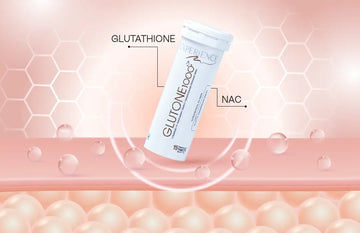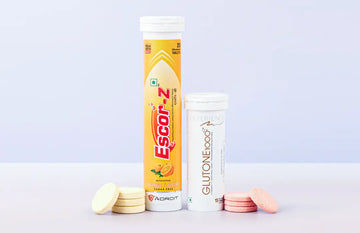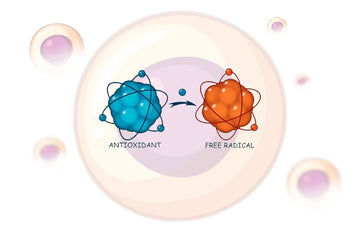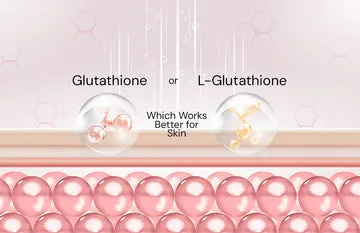When it comes to skin health, antioxidants are the heroes working silently behind the scenes. Among them, two names often come up in beauty and wellness discussions: glutathione vs NAC (N-Acetyl Cysteine). Both are powerful, but they play different roles in how your body—and your skin—handle oxidative stress, pigmentation, and overall radiance.
If you’ve ever wondered whether a glutathione supplement vs NAC is better for glowing, even-toned skin, this blog breaks it down for you.
What is Glutathione?
Often called the “master antioxidant,” glutathione is naturally present in every cell of the body. It is made up of three amino acids—cysteine, glycine, and glutamic acid—and plays a central role in neutralising free radicals, detoxifying cells, and regulating melanin production.
For skin, glutathione is especially known for:
-
Supporting the production of lighter pheomelanin over darker eumelanin, reducing hyperpigmentation.
-
Defending against oxidative stress caused by UV rays and pollution.
-
Promoting an even, radiant skin tone with consistent supplementation.
This makes a glutathione supplement like Glutone 1000 a go-to choice for those targeting pigmentation and skin clarity.
What is NAC (N-Acetyl Cysteine)?
NAC is a derivative of the amino acid cysteine and is primarily valued as a precursor to glutathione. In other words, NAC helps your body produce more glutathione naturally.
While NAC is often used as a liver-support and detox supplement, its role in skincare is indirect. Instead of directly reducing melanin or protecting against oxidative stress like glutathione, NAC works by ensuring your cells have the raw material needed to create their own glutathione reserves.
Glutathione vs NAC – Mechanism for Skin Health
Here’s a simplified look at how the two compare when it comes to skin:
|
Aspect |
Glutathione |
NAC (N-Acetyl Cysteine) |
|
Primary Role |
Acts as the body’s master antioxidant directly |
Precursor that boosts natural glutathione levels |
|
Skin Mechanism |
Regulates melanin, reduces oxidative stress, brightens skin |
Provides cysteine to help the body synthesise glutathione |
|
Direct Effect on Skin |
Brightens, reduces pigmentation, supports collagen & hydration |
Indirect – improves skin health by maintaining glutathione reserves |
|
Best Use Case |
Targeting hyperpigmentation, dullness, and uneven tone |
Supporting long-term antioxidant balance and detoxification |
-
Primary Role
Glutathione acts directly as the body’s master antioxidant, while NAC (N-Acetyl Cysteine) functions as a precursor, boosting the body’s natural production of glutathione.
-
Skin Mechanism
Glutathione regulates melanin, reduces oxidative stress, and brightens skin, whereas NAC works by providing cysteine, the building block needed for the body to synthesise glutathione.
-
Direct Effect on Skin
Glutathione directly supports brighter skin, reduces pigmentation, and aids collagen and hydration, while NAC has a more indirect effect—helping maintain skin health by sustaining glutathione reserves.
-
Best Use Case
Glutathione is best suited for addressing hyperpigmentation, dullness, and uneven tone, whereas NAC is better for long-term antioxidant balance and detoxification support.
N-acetyl cysteine vs glutathione isn’t a competition as much as a partnership—NAC supports, while glutathione delivers.
Also Read:- Glutathione vs Collagen
Benefits of Glutathione & NAC for Skin at a Glance

Benefits of Glutathione for Skin
-
Reduces Pigmentation
Shifts melanin production toward lighter pigments, helping fade dark spots and acne scars.
-
Brightens Skin Tone
Promotes overall radiance and clarity.
-
UV & Pollution Protection
Neutralises free radicals that accelerate ageing.
-
Detoxification
Keeps skin cells clear and healthy by aiding toxin removal.
-
Clinically Validated
Branded forms like Setria® Glutathione (in Glutone 1000) are backed by global research for safety and efficacy.
Read our blog:- Glutathione Benefits for Skin
Benefits of NAC for Skin
-
Glutathione Precursor
Provides cysteine to boost your body’s natural glutathione levels.
-
Antioxidant Support
Indirectly strengthens the skin’s defence against oxidative stress.
-
Detox & Repair
Supports liver function, which indirectly benefits skin clarity.
-
Anti-Inflammatory Effect
Helps calm oxidative stress that can worsen acne or uneven tone.
While NAC supports skin health, its effects are indirect and slower compared to taking a glutathione supplement.
Which is Better for Skin – Glutathione or NAC?
When comparing glutathione vs NAC, the key difference is how directly they act on the skin. Glutathione works immediately as the master antioxidant—reducing pigmentation, brightening tone, and protecting against oxidative stress. NAC, on the other hand, is a precursor that helps the body produce more glutathione, making its effects slower and more indirect. For visible results in hyperpigmentation and radiance, a glutathione supplement like Glutone 1000 is usually the more effective choice.
Glutone Glow Regimen: How to Maximise Results
Can’t decide between glutathione supplement vs NAC, try Glutone 1000 with these simple lifestyle choices that will amplify your results:
-
Daily SPF: Shields skin from UV-triggered pigmentation.
-
Hydration: Drink at least 2–3 litres of water daily to support detox.
-
Balanced Diet: Antioxidant-rich foods like citrus, berries, and leafy greens work synergistically.
-
Consistency: Take one Glutone 1000 tablet daily for at least 3–6 months.
By combining smart supplementation with healthy habits, you’ll see your glow journey accelerate.
Both glutathione and NAC support skin health, but they work differently. NAC boosts the body’s antioxidant reserves, while glutathione directly brightens skin, reduces pigmentation, and protects against oxidative stress. For visible results, a clinically validated glutathione supplement like Glutone 1000 is the clear choice.








 Mon to Sat - 10 am to 7 pm
Mon to Sat - 10 am to 7 pm